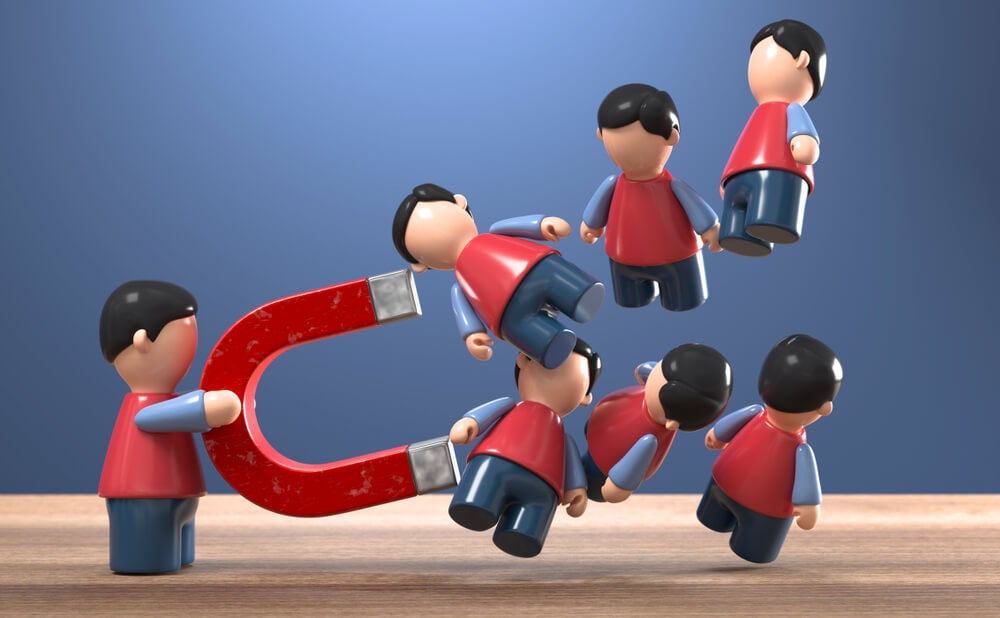Human magnet syndrome is a concept invented by psychologist and therapist Ross Rosenberg. It is also the name of a book that has reached a real sales record. The content revolves around a reality discovered by Rosenberg: there is a strong attraction to the people who, sooner or later, will make us suffer.
According to this thesis, what do we call chemistry?Between two people it would be nothing more than the expression of this dysfunctional attraction that sometimes occurs. There are two impulses that make up this chemistry: one of love and one of war. In other words, there’s a big attraction to people. with whom we will end up having great conflicts.
- This would explain why people often don’t pay attention to those who have great virtues and offer stability and tenderness.
- It’s not uncommon for less balanced people to do better in the world of love attraction.
- Human magnet syndrome explains why.
When people who are victims of the human magnet meet, there is a very strong attraction, there is a powerful feeling that the other is special and that there is a particular connection, there is also an intense desire to caress this person or make physical contact. with them.
People are carried away by this powerful attraction and a generally very intense relationship begins, each one feels that the other is “the love of his life”. Someone who complements you and makes you happy.
However, conflicts arise sooner or later. Jealousy, difference of opinion, possessiveness or others. Thus, the same person who made us immensely happy now begins to be the cause of suffering.
The two involved get hurt and everything becomes a real war, even though it’s very difficult for the two of you to split up.
According to Rosenberg, human magnet syndrome occurs in its classic form between two types of people: co-descendants and narcissists, notes that each relationship generates a certain codependency in the couple, the problem arises when it is the predominant note and generates a real drama for those who live it.
Codependency means that one of the couple’s members goes to the other without limits, tries to do his best, without filtering or measuring, the other, who would be the narcissist, appreciates this unconditional surrender. This corresponds to expressions of affection, attention and care, until now everything seemed harmonious and perfect.
However, the narcissist will soon want more. Even if the other is fully delivered, your partner will feel that they are missing something, over time they are no longer satisfied with what they receive and ask for or demand more and more.
The co-descendant, on the other hand, will feel that it is not of sufficient value. You’ll feel like the other one, maybe, doesn’t need it enough. This will fill him with insecurity and he will always try to give more, even if he ends up complaining about each other’s indolence.
Those who are immersed in human magnet syndrome create relationships that, over time, become painful and suffocating, yet attraction persists and sometimes becomes stronger, despite the mutual damage done.
For some reason, the co-descendant wants to remain under control. In turn, the narcissist desperately needs his “worshipper. “That is why he resists ending a relationship that essentially makes them suffer: because he perpetuates their imbalance.
The mechanism is similar to what happens in an addiction. At first, the sensation is extremely pleasant and produces an intense euphoria. Some call it “happiness”. Although, over time, this pleasant sensation disappears and great suffering occurs in its place, people do not resign themselves to abandoning this initial pleasure, one way or another, they continue to compulsively seek this feeling.
The co-pendent and the narcissistic are, from a psychological point of view, totally opposite, so they also become complementary. It is often possible to hear one say that the other is his “half-orange”, and so it is, albeit pathologically.
So human magnet syndrome shows why we love him, those who make us suffer. It also shows that every time this happens, it has more to do with individual pathologies reinforced as a couple than with great and stormy loves.

